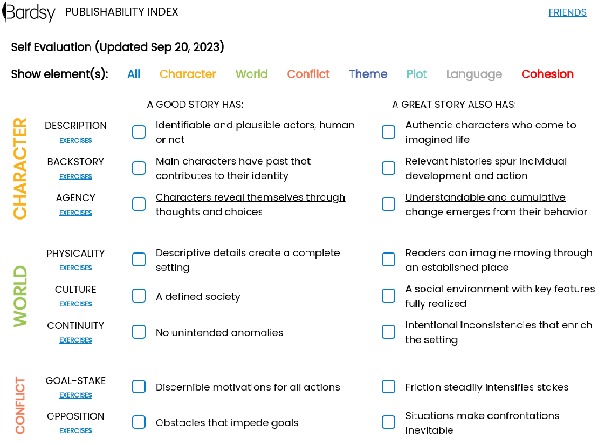😃 Subscribe for Weekly Posts:


The PI is an evaluative tool that includes every aspect of great storytelling.
How good is my story? How can I make it better? Is it publishable? These essential questions weigh heavily on every writer’s mind.
To answer them, you need good feedback, but it's hard to get. Friends, family or haphazard writing groups tend to be best at emotional support, though some can't even deliver that. At the other extreme, the publishing industry revolves around rewarding a vanishingly small number of works with commercial success—the ultimate thumbs-up—while paying little attention to nurturing new authors. The endless stream of how-to books, gurus and tools designed for writers does not provide a precise, consistent guide nor does it deliver a useful, comprehensive way to evaluate writing.
How to Answer the Question: How Good Is My Story?
Bardsy's Publishability Index™, or PI, was created to organize and expand on only the best advice regarding great storytelling in order to deliver precise, comprehensive and consistent evaluations. Here's how:
I. The PI captures the collective wisdom of the best writing advice, resolves conflicts and organizes it systematically.
II. It provides precision through clear standards on each of 23 dimensions to help you apply this knowledge.
III. It adds a new set of considerations, called COHESION, that some guides include but fail to articulate.
Some would say we’ve set an impossible task. Not only is every story unique, they might argue, but each reader's subjective experience defies quantification. That’s true, to a point. Stories are unique, and feedback is ultimately an individual's opinion. Nevertheless, we can harness time-tested scientific techniques to account for uniqueness and subjectivity. This effort leads to feedback that is at once individualized, yet systematic. Before describing the PI and its use, let's discuss these three standards for ideal feedback.
First, consider the importance of precision. Imprecise feedback, such as that provided by a friend (or professional) who pats you on the back and says "great story," isn't helpful. Though probably well-intentioned, such comments are dead ends because they lack specificity. Ideal feedback points to exactly what works in a story and what doesn’t.
Next, comprehensiveness. Ideal writing feedback must first answer the "how good is my story" question. Doing so demands a holistic evaluation: one that addresses every aspect of a work. A long critique that focuses on character, for example, can be useful, but obviously leaves out much of what makes a story great.
Finally, consistency. In an ideal world, a story submitted for comment would receive the same comments, no matter when it's read. Likewise, the feedback would be similar no matter who reads it. It's easy to see inconsistency's undesirability. You wouldn't have confidence in someone who offers one opinion in the morning and a different one in the afternoon. Likewise, a writing workshop that reaches consensus offers more direction, all else equal, than one that doesn't. That being said, creating a system to provide consistent feedback is a challenge, if only for the reasons mentioned above (uniqueness and subjectivity).
To understand how the PI approaches this ideal, notice feedback's similarity to something we're familiar with: grading. Above all, both are evaluative. In addition, the hardest assignments to grade are those that require complex subjective evaluations, just like creative writing feedback. Content analysis is the social scientific term for conducting these kinds of evaluations. Feel free to google for more info. Essentially, this technique, which is inherent to successful grading systems, depends on what we know as rubrics: clear, coherent rules for examining and scoring material.

At its most basic, the PI is a rubric for evaluating stories. You can examine it thoroughly here.

At the top, you'll see that the PI distills much of the conventional wisdom regarding what makes a story great. You're already familiar with the first six elements: character, world, conflict, theme, plot and language. For precision's sake—not to mention comprehensiveness and consistency—the elements are further divided into dimensions. Character, for example, is broken down into description, backstory and agency. To further reach these standards, each dimension also contains two criteria, labeled "good" and "great." Thus, the PI starts with six elements and 18 dimensions, each with two criteria.
Below these six elements, you'll find a new element: cohesion. Though harder to articulate, cohesion is absolutely critical to successful writing. In our research, we found that few guides mention cohesion, let alone discuss it rigorously. The notion behind the cohesion element stems from the truthful cliché that a great story's whole is more than the sum of its parts. To capture this insight, the PI assesses cohesion along five dimensions: environment, veracity, integration, dynamics and resonance. Within each, the criteria call for assessing how well elements synergize.
We find that the PI is easiest to use as a checklist of 23 dimensions and 46 criteria. To evaluate a story, go through the list, dimension by dimension. Read the criteria for each, first “good,” then “great,” asking whether or not that criteria is present or absent. This mode of examination is common to all science-based content analysis because it tends to produce consistent evaluations. After some practice, you'll find that it's also easy to apply, allowing you to answer the question, "How good is my story?"
To illustrate, the character backstory dimension requires that a story's characters have a "past that contributes to their identity" to be considered good. If, after reflection, you determine that this statement is applicable, check this item. If not, move down to the next dimension. On the other hand, if you're able to check off "good," consider the “great" criterion, which is defined as "relevant histories that spur individual development and action." If you're able to check this off, congratulate yourself, and continue your review.
You can see why we think the PI is comprehensive as it stands, because it includes every aspect that underpins great stories. However, feel free to reach out if you think something is missing, and we'll consider it for future editions.
Ultimately, the PI's value can only be found in its utility. We use it, first, to judge Bardsy's story contests. After reading every entry, trained editors move down the list, reflecting, checking boxes and making notes as they go. Entries with lots of checks are invariably better than those with few. Crucially, the “great" checks reliably identify an entry's strengths, freeing the editor to make precise recommendations based on the rest, especially those dimensions where the story hasn't satisfied the "good" criteria.
These recommendations highlight the PI's second use: to provide developmental feedback. A completed PI gives editors a list of an entry's strengths as well as areas that need work. By design, the PI's language lends itself to specific recommendations. To continue the above illustration, if a character "lacks a relevant history that spurs individual development," then that's something an author should seriously consider adding to their story.
In an ideal world, the author's revisions address each concern, leading to another PI-based review. This iterative process would continue until the story receives “great” checks across all 23 dimensions. We consider a story that achieves this success to be eminently publishable. Naturally, this is easier said than done and, empirically speaking, few stories reach this level.
The PI has two more uses. First, you can use the PI as food for thought while you write, and an evaluative tool when you've completed a draft. Second, we find that as our editors and members become familiar with the PI, its dimensions and criteria, they use its terms to discuss the stories they're reading and working on; we'll discuss this second use more in future blogs.
But any tool is worthless if unused. Try the PI out on your latest story to see how well it works for you. And you're welcome to enter our contest to receive the precise, consistent and comprehensive feedback our editors provide.
CLICK A TAB TO USE WILL.POWER
TO DO LIST:
Add tasks to your sortable list, then revel in checking them off.
SCRATCHPAD:
Cache your gems as they fall in this always accessible place.
PRIVATE JOURNAL:
Reflect on your process — good, bad and ugly — in your dated diary.
TRACKING:
Measure your progress with key writing metrics, automatically,
TO DO LIST:
Add tasks to your sortable list, then revel in checking them off.
SCRATCHPAD:
Cache your gems as they fall in this always accessible place.
PRIVATE JOURNAL:
Reflect on your process — good, bad and ugly — in your dated diary.
TRACKING:
Measure your progress with key writing metrics, automatically,
ADD DO
Show Dones
Metric:
ADD
Words
Minutes
Click anywhere to close